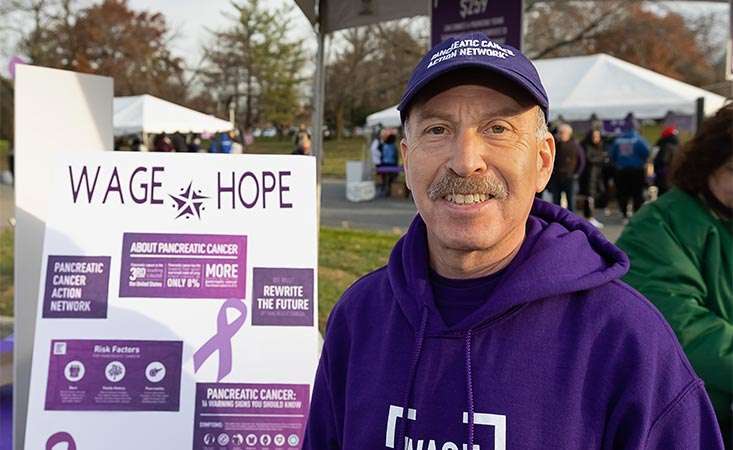
Pancreatic cancer survivor Steven Merlin is dedicated to spreading awareness about pancreatic cancer and providing hope for those diagnosed with the disease.
Steven Merlin is a 12-year pancreatic cancer survivor who is doing well today in large part thanks to his treatment plan – which was ahead of its time.
Steven was diagnosed with stage III locally advanced pancreatic acinar cell carcinoma – a very rare, highly aggressive form of pancreatic cancer – in 2012.
He had surgery – not usual for someone with his disease stage. But the follow-up chemotherapy treatment, Gemzar®, had no impact, and the cancer spread.
So, Steven switched to the chemotherapy FOLFIRINOX, which started shrinking his tumors.
Meanwhile, he saw a doctor who specializes in genetics and got genetic testing that revealed a BRCA2 mutation.
Pancreatic cancer patients who have BRCA mutations may respond particularly well to two types of treatment: platinum-containing chemotherapy (like FOLFIRINOX) and PARP inhibitors (a type of targeted therapy).
But when Steven was being treated, that wasn’t widely known. And precision medicine – treatment based on a patient’s biology or the biology of their tumor – was not often used for pancreatic cancer at the time.
Nevertheless, the doctor knew about the treatment approach’s potential. Steven and his care team decided to explore clinical trials focused on PARP inhibitors, to give Steven a chance to participate in the research. Steven turned to PanCAN Patient Services, who helped him research and connect with trials.
He found one he wanted to pursue.
Steven consulted with his primary oncologist as well as the investigator running the trial and decided to continue on FOLFIRINOX until he wasn’t benefitting from it anymore.
Then, in October 2014, he switched over to the clinical trial.
Steven was the first patient in the USA on the trial that resulted in having a complete response.
“FOLFIRINOX put me into remission,” Steven said. “The PARP inhibitor kept me there.”
Today, it is more common for pancreatic cancer patients to get treatment based on their tumor’s biology or their genetic makeup – through their institution or through free biomarker testing services like PanCAN’s Know Your Tumor® – than it was in 2014. Thanks to trailblazers like Steven who participated in clinical trials, there is now a PARP inhibitor approved by the FDA for certain pancreatic cancer patients with BRCA mutations.
“We all have a purpose,” he said. “I got my diagnosis and could have said, ‘This is it for me.’ But I didn’t.”
An area he is particularly passionate about is advocacy.
He continues to connect with his members of Congress as a PanCAN advocate, urging them to increase federal research funding for the disease. He also serves as the Research Patient Advocate on the GI Cancers Committee of Eastern Comprehensive Oncology Group-American Academy of Radiology and Imaging Network (ECOG-ACRIN) and on the Cancer Communications Committee of the American Society of Clinical Oncology (ASCO).
It’s all part of how he gives back: Both to pay tribute to everyone who has participated in pancreatic cancer clinical trials and to make sure that future patients continue to benefit from clinical research like he did.
“I am cognizant that every FDA treatment we have for pancreatic cancer began as a clinical trial,” he said. “I am grateful to those who participated in clinical trials to make it possible.”
Any treatments, including clinical trials, mentioned in this story may not be appropriate or available for all patients. Doctors take many things into account when prescribing treatments, including the stage and type of cancer and overall patient health.















